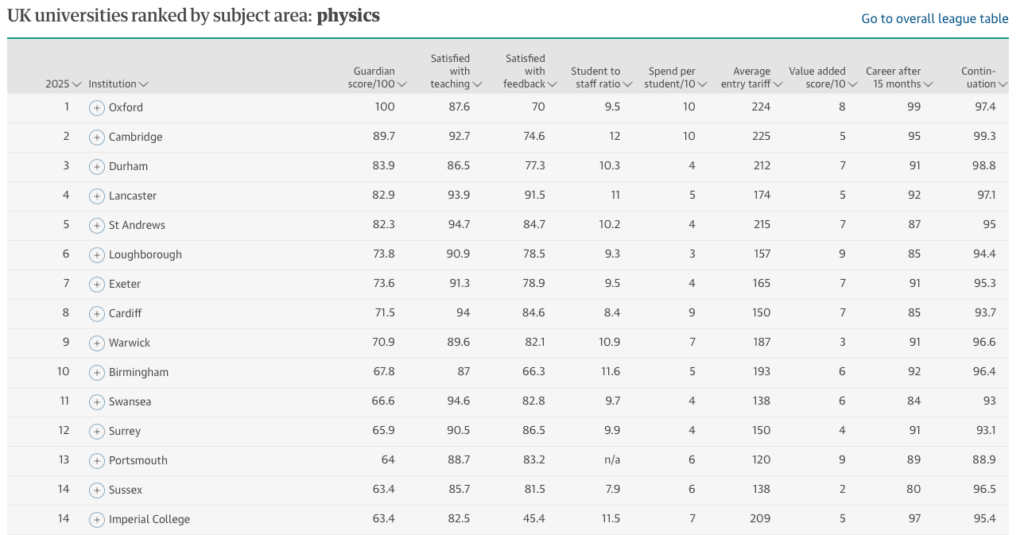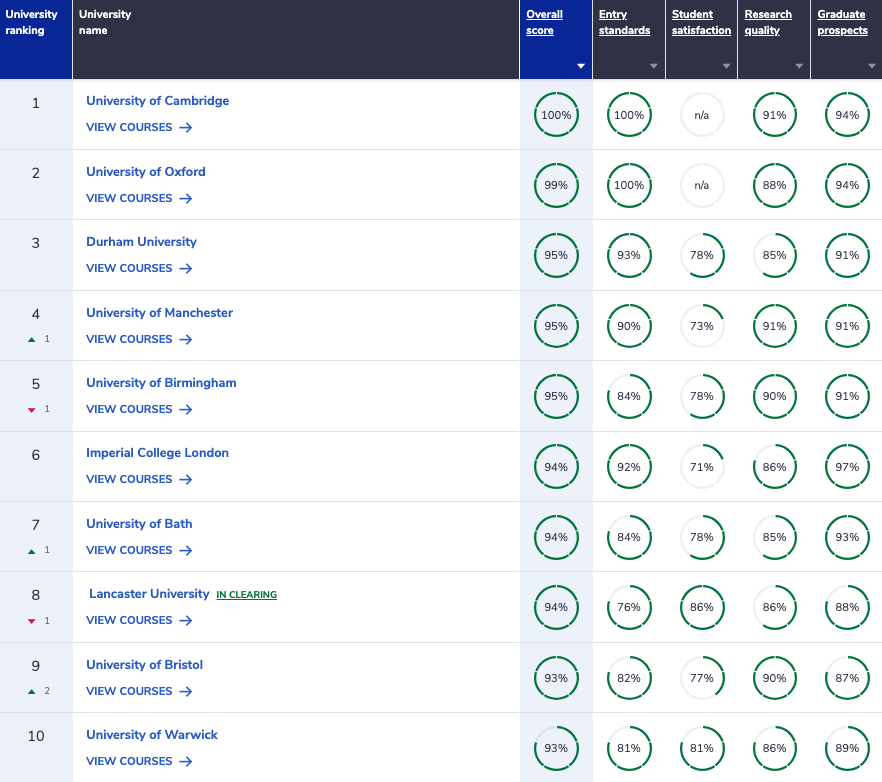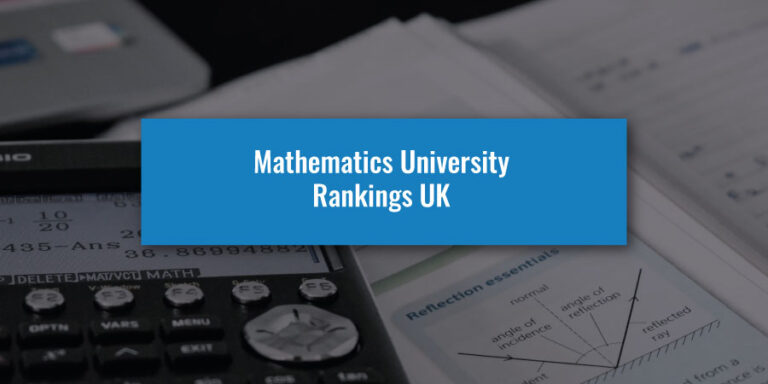The UK has a limited number of Physics university degrees available, but which ones are considered the best?
The subject is one of the three core sciences and has been a cornerstone in STEM education for centuries. However, you may be surprised by how few universities actually teach it.
However, despite this, ranking tables are still available to see an overview of which universities are best at teaching this subject. In this guide, we’ll look at the two most popular university ranking tables in the UK to see how they rank these Physics degrees. Plus, we’ll explore how reliable these rankings are and in what context they should be considered when choosing university options. Let’s get started!
Who Makes The Physics University rankings?
You may be wondering how multiple ranking tables can exist if they’re meant to provide an object ranking. In reality, these rankings are far from objective and can vary based on how each organisation interprets data and scores the universities. Although the data used is taken from similar sources, it’s the use of the data that creates differing rankings between organisations.
We’ll discuss how reliable these tables actually are later, but let’s first take a look at the complete ranking tables for Physics, as well as how each organisation presents their data.
Want to get your offer to study Physics at Oxford?
Hoping to study Physics at Oxford? You’ll need to write the perfect Personal Statement, perform well on the PAT and interview like a pro to get your dream Oxford Physics offer.
Discover our Full-Blue Physics Programme for comprehensive admissions support by clicking the button below to enrol and triple your chances of success.
The Guardian Physics Rankings
To create their university rankings rankings (including Physics), The Guardian uses the following metrics:
Guardian score/100 – rating of excellence based on a combination of the other factors.
Satisfied with the course – the rating of the overall quality of the course, given by final-year students in the latest National Students Survey (NSS) given as a percentage.
Satisfied with the teaching – the rating of the quality of teaching on the course given by final-year students in the latest NSS.
Satisfied with feedback – the rating of the feedback and assessment, given by final-year students in the latest NSS.
Student to staff ratio – number of students per member of teaching staff.
Spend-per student/10 – money spent on each student, excluding academic staff costs, given as a rating out of ten.
Average entry tariff – typical UCAS scores of young entrants to the department.
Value-added score/10 – this score compares students’ degree results with their entry qualifications, to show how effectively they are taught – given as a score out of ten.
Career after 15 months – percentage of graduates who find graduate-level jobs, or are in further study at professional or higher education level, within 15 months of graduation.
Continuation – percentage of first-year students continuing to second-year.
This data is gathered from a few different sources, including the National Student Survey (NSS) (for information on student satisfaction rates) and the universities themselves (who provide information on admissions, spending and more). Since the information is all sources externally, it means there’s no bias from The Guardian in terms of what information their rankings are based on.
The Guardian Physics University Rankings 2025
Let’s take a look at The Guardian’s full league table for Physics degrees, including the results for 2025 and 2024 compared:
| Position | University | Previous Position (2024) |
|---|---|---|
| 1 | University of Oxford | 1 (=) |
| 2 | University of Cambridge | 3 (>1) |
| 3 | Durham University | 2 (<2) |
| 4 | Lancaster University | 4 (=) |
| 5 | University of St Andrews | 5 (=) |
| 6 | Loughborough University | 7 (>1) |
| 7 | University of Exeter | 9 (>2) |
| 8 | Cardiff University | 10 (>2) |
| 9 | University of Warwick | 8 (<1) |
| 10 | University of Birmingham | 12 (>2) |
| 11 | Swansea University | 17 (>6) |
| 12 | University of Surrey | 16 (>4) |
| 13 | University of Portsmouth | 20 (>7) |
| 14 (=) | University of Sussex | 23 (>9) |
| 14 (=) | Imperial College London | 14 (=) |
| 16 | Royal Holloway, University of London | 27 (>11) |
| 17 | Heriot-Watt University | 18 (>1) |
| 18 | University of Manchester | 11 (<7) |
| 19 | University of Bath | 22 (>3) |
| 20 | University of Edinburgh | 15 (<5) |
| 21 | University of Hull | 31 (>10) |
| 22 | University of Salford | 19 (<3) |
| 23 | Northumbria University | 26 (>3) |
| 24 | University of Southampton | 24 (=) |
| 25 (=) | University of Strathclyde | 25 (=) |
| 25 (=) | University College London (UCL) | 13 (<12) |
| 25 (=) | University of Leicester | 21 (<4) |
| 25 (=) | University of Bristol | 30 (>5) |
| 29 | Queen’s University Belfast | 38 (>9) |
| 30 | University of Liverpool | 33 (>3) |
| 31 | University of Nottingham | 28 (<3) |
| 32 | Newcastle University | 39 (>7) |
| 33 | University of Leeds | 37 (>4) |
| 34 | University of Dundee | 41 (>7) |
| 35 | Nottingham Trent University | 43 (>8) |
| 36 | University of York | 35 (<1) |
| 37 | University of Glasgow | 34 (<3) |
| 38 | University of East Anglia (UEA) | 40 (>2) |
| 39 | Keele University | 32 (<7) |
| 40 | University of Kent | 44 (>4) |
| 41 | Aberystwyth University | 45 (>4) |
| 42 | Queen Mary, University of London | 47 (>5) |
| 43 | University of Sheffield | 36 (<7) |
| 44 | University of Hertfordshire | 42 (<2) |
| 45 | King’s College London | 46 (>1) |
So, what can this table tell us about the Physics degrees available in the UK in 2025? Let’s break down some of the key points.
Firstly, looking at the top ten, seven of the universities are Russell Group Universities (including both Oxford and Cambridge). Seeing Russell Group universities this high isn’t surprising, but within this top ten, there are no London-based universities, which is unusual for a UK university ranking list.
The first London university isn’t seen until 14th – Imperial College London – which is generally one of the highest-ranked universities in the world. One of London’s most popular universities – King’s College London – was ranked last at 45th.
It’s important to highlight that one of the top-ranking universities – Cambridge – doesn’t offer a dedicated undergraduate Physics degree. Instead, this table is considering the Natural Science degree, which offers students the chance to specialise in physical sciences. Whether or not the data for this placement only considers the physics aspect of the degree is unknown.
Compared to the 2024 list, we can see a few significant position changes for universities. Royal Holloway, University of London saw the largest rank increase, moving from 27th to 16th. The University of Hull was close, moving ten spaces from 31st to 21st. Hull saw the largest decrease in ranking between 2023 and 2024, so it is interesting to see that it has began to climb the rankings again.
The biggest drop came from another of London’s most popular universities, UCL. The university had ranked in 13th in 2024 but fell 12 places to joint 25th this year. Strangely, two universities were omitted from the table this year; the University of Aberdeen and the University of Lincoln. Aberdeen had ranked in 6th in 2024.
The Complete University Guide Physics Rankings
Overall score – the total score calculated by The Complete University Guide’s independent and trusted methodology.
Entry standards – the average UCAS tariff of new students entering university.
Student satisfaction – a guide to how satisfied students are with the quality of teaching they receive.
Research quality – a measure of the quality of the research undertaken by the university.
Research intensity – a measure of the proportion of staff involved in high-quality research at the university.
Graduate prospects – outcomes – a guide to the success of graduates after leaving university.
Graduate prospects – on track – a measure of whether recent graduates agree that their current activity fits with their future plans.
Although the Complete University Guide groups various data points into broader categories, the overall results convey similar information to The Guardian’s rankings – just with fewer metrics. Data is collected from the NSS and universities, just like The Guardian, but they use different systems for interpreting and scoring it. This is what causes the variations in university placements between the two lists.
Complete University Guide Physics University Ranking Table 2025
Now, let’s look at the Complete University Guide Physics ranking table, including the comparison to 2024’s rankings.
| Position | University | Previous Position (2024) |
|---|---|---|
| 1 | University of Cambridge | 1 (=) |
| 2 | University of Oxford | 2 (=) |
| 3 | Durham University | 3 (=) |
| 4 | University of Manchester | 5 (>1) |
| 5 | University of Birmingham | 4 (<1) |
| 6 | Imperial College London | 6 (=) |
| 7 | University of Bath | 8 (>1) |
| 8 | Lancaster University | 7 (<1) |
| 9 | University of Bristol | 11 (>2) |
| 10 | University of Warwick | 10 (=) |
| 11 | University of St Andrews | 9 (<2) |
| 12 | University of Edinburgh | 13 (>1) |
| 13 | University College London (UCL) | 12 (<1) |
| 14 | Queen’s University Belfast | 16 (>2) |
| 15 | University of Exeter | 17 (>2) |
| 16 | University of Nottingham | 14 (<2) |
| 17 | University of Sheffield | 18 (>1) |
| 18 | University of Glasgow | 15 (<3) |
| 19 | University of York | 19 (=) |
| 20 | University of Surrey | 22 (>2) |
| 21 | Cardiff University | 20 (<1) |
| 22 | University of Southampton | 21 (<1) |
| 23 | University of Leeds | 23 (=) |
| 24 | University of Dundee | 30 (>6) |
| 25 | Royal Holloway, University of London | 24 (<1) |
| 26 | King’s College London | 26 (=) |
| 27 | Loughborough University | 27 (=) |
| 28 | University of Strathclyde | 25 (<3) |
| 29 | Heriot-Watt University | 32 (>3) |
| 30 | University of Liverpool | 28 (<2) |
| 31 | Newcastle University | 33 (>2) |
| 32 | Swansea University | 38 (>6) |
| 33 | University of Leicester | 29 (<4) |
| 34 | University of Sussex | 37 (>3) |
| 35 | University of Portsmouth | 40 (>5) |
| 36 | University of Hull | 35 (<1) |
| 37 | University of Lincoln | 31 (<6) |
| 38 | Keele University | 34 (<4) |
| 39 | Northumbria University | 36 (<3) |
| 40 | University of Aberdeen | 44 (>4) |
| 41 | Queen Mary, University of London | 42 (>1) |
| 42 | University of Central Lancashire | 43 (>1) |
| 43 | University of Salford | 41 (<2) |
| 44 | Nottingham Trent University | 45 (>1) |
| 45 | Aberystwyth University | 46 (>1) |
| 46 | University of Hertfordshire | 39 (<7) |
| 47 | Sheffield Hallam University | 48 (>1) |
| 48 | University of Kent | 47 (<1) |
Compared to The Guardian’s table, these rankings are much more stable compared to 2024, with fewer major changes. However, one important thing to note is that this ranking table considers both Physics and Astronomy degrees. One extra university is featured on this list, but there are actually several different universities that aren’t seen on both lists, including Sheffield Hallam and UEA.
First, looking at the top ten, we can see a fairly similar selection of universities to The Guardian. Cambridge and Oxford take the top spots with Durham following after. Lancaster and Warwick are also here, but the rest of the top ten features more city universities than The Guardian’s including Manchester, Birmingham and Bristol, as well as Imperial College London.
The variance isn’t too big between the two lists, as most of the universities featured were still ranked fairly high by The Guardian. However, it’s worth nothing that the University of Aberdeen – which The Guardian placed 6th – was ranked 40th by Complete University Guide, a huge 34 place difference.
As stated, position movements were far less frequent and extreme compared to The Guardian’s list. The biggest increase was shared between Dundee and Swansea (both up 6 spots), while the biggest drop came from the University of Hertfordshire (down 7 spots).
Access "The Oxbridge Application Vault"
- 300+ page ebook for Oxbridge Applicants
- 25 page ebook for Personal Statement
- 2h+ online course to succeed in any exam
- Online Oxbridge Success Calculator
- 12 page ebook about UniAdmissions

Access "The Big Book Of Oxbridge Applications" For FREE
Oxford offers a fantastic Physics degree, while Cambridge offers Physics within its Natural Science degree. Learn more about these two degrees in The Big Book Of Oxbridge Applications, which you can download for free here. Through over 350 pages, you’ll find:
- Over 40 admissions test practice questions
- 28 example Oxbridge Personal Statements
- Interviews with Oxbridge students and graduates
- Additional downloadable resources
Fill in your details below to claim your digital copy today!

The Best and Worst UK Universities For Physics
Now that we’ve seen the full tables, let’s hone in on the tops and bottoms of each list. While it’s easy to label these universities as the “best” and “worst”, it’s important to consider that these rankings are only one measurement of a university’s quality. Take these assessments with a grain of salt, as you may find these universities appeal to you more or less than the rankings would suggest.
Best Universities For Physics UK
First, here are the top five universities on each list. Looking at these, we can see which universities are generally considered the best in the UK for Physics:
Complete University Guide
- University of Cambridge
- University of Oxford
- Durham University
- University of Manchester
- University of Birmingham
The Guardian
- University of Oxford
- University of Cambridge
- Durham University
- Lancaster University
- University of St. Andrews
Oxford and Cambridge each take the top spot on one list, though they each appear on both top fives. Remember that, at Cambridge, this isn’t a dedicated Physics degree but a more general Natural Sciences degree.
Durham appears on both lists, ranking 3rd on the Complete Uni Guide List and 2nd by The Guardian. This is generally one of Durham’s best-ranked degrees, as it isn’t the most common pick in the top five entries on ranking tables.
The last two universities are different on each list. Manchester performed decently on The Guardian’s ranking (appearing at 18th), but Birmingham did even better, ranking in 10th. Lancaster and St Andrew’s also performed well on Complete University Guide’s list.

Worst Universities For Physics UK
Next, here are the five lowest-ranked universities for Physics. Although they appeared at the bottom of the list, it doesn’t mean they’re objectively “bad” or “the worst” Physics degrees, they’re just the ones that ranked lower on the list.
Complete University Guide
- University of Kent
- Sheffield Hallam University
- University of Hertfordshire
- Aberystwyth University
- Nottingham Trent University
The Guardian
- King's College London
- University of Hertfordshire
- University of Sheffield
- Queen Mary, University of London
- Aberystwyth University
The bottom five of Complete University Guide’s list is mostly filled with lesser-known universities in the UK, which is typical for subject ranking tables like these. However, The Guardian’s list is far more surprising.
This is because the bottom of it’s ranking features three Russel Group universities, which are typically ranked among the top of ranking tables. Queen Mary and Sheffield are two of the lesser Russell Group Universities, but King’s College London (which is sometimes seen as part of the G5 collection of universities) taking last place is incredibly surprising (although this isn’t the only year that KCL ranked low on The Guardian’s Physics ranking).
Reasoning for this placement seems to be down to fairly low career stats (88% in a career after 15 months) an average spend per student 5/10 and an extremely low score for value added (2/10). Compared to some of the higher-ranking universities it’s easy to see how this position could be justified.
One last interesting fact is that almost all of these universities are based in England, the exception being the Welsh university Aberystwyth. It is also one of two universities to feature at the bottom of both lists (the other being Hertfordshire) However, despite all of this, remember that all of this shouldn’t be taken too seriously, as these rankings aren’t definitive and can change from year-to-year.
Which Ranking Table Should I Follow?
So, you probably shouldn’t be basing your decisions on the ranking tables alone, so what are they helpful for? Ideally, these tables should be used as a tool to start your research. While they’re not always consistent, both tables generally do a good job of highlighting the most well-regarded universities, so these may be the ones you wish to apply to if reputation is important to you. However, there are plenty of other factors to consider too.
For example, if you’re worried about how well you may do in your exams, you’ll need to review the entry requirements and acceptance rates for each university to see which ones you have a good chance of getting into.
If you’re aiming for top-ranking universities like Oxford and Cambridge, you’ll face a more rigorous application process, higher entry requirements and lower acceptance rates (13.8% at Oxford and 16.6% at Cambridge). It’s essential to make sure you’re a competitive candidate for these universities based on your current or predicted grades.
Statistics aren’t the only factor to consider. Keep in mind that university life involves much more than academics, as most students will spend at least three years living on campus full-time. It’s important to ensure you like the campus, facilities, and surrounding area before making a decision. Attending open days is an excellent way to get a sense of a university’s atmosphere and facilities, so be sure to visit the ones that interest you most.
The last point we’d like to emphasise is that you shouldn’t immediately overlook lower-ranking universities. While they may not match the top institutions, many still provide a high-quality education, even if there are some drawbacks. If a lower-ranked university appeals to you, it’s still worth applying, as it could be a great fit and typically comes with less competition. The key is to make sure you’ve done thorough research based on the things you value.
Conclusion
That wraps up our exploration of Physics university rankings in the UK. The main thing to take away from this guide is that, while these tables are useful tools, they only provide part of the picture. Personal preference may not outweigh scores based on data for everyone, but it’s still important to consider both when choosing a university.
Most importantly, these rankings are neither definitive nor official. Since they can significantly vary, it’s up to you to decide which one you trust and how much weight you give to rankings overall. Ultimately, if you choose a university you’re happy with, the approach you took to make that decision has been a success.
Worried about your Oxford chances? Our offer success rate is 59%
Applying to Oxford Physics is immensely competitive and it is crucial that you give yourself the best chance of success. We help you craft the perfect Personal Statement, achieve a highly competitive Admissions Test score and teach you how to Interview effectively – covering all areas of your Oxbridge application.
Discover our Full-Blue Physics Programme now to learn how you can triple your chances of success.









